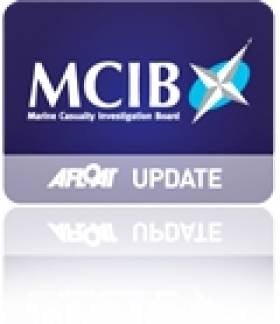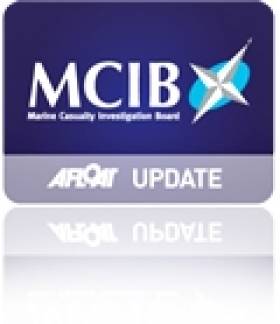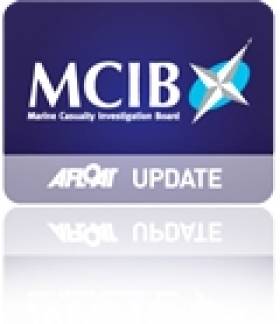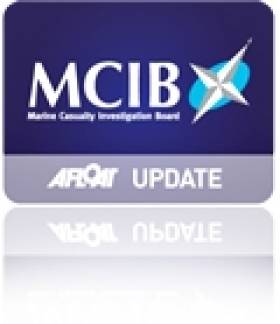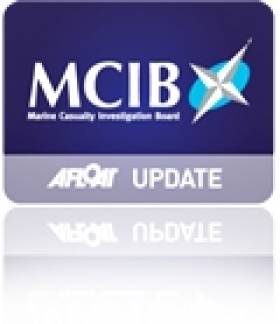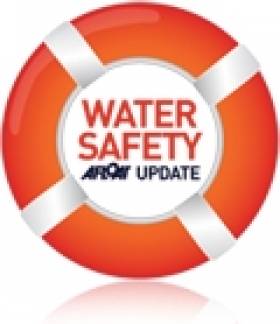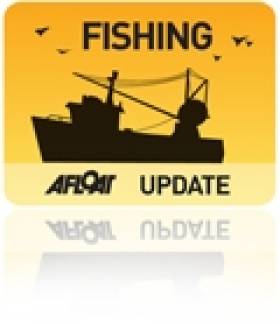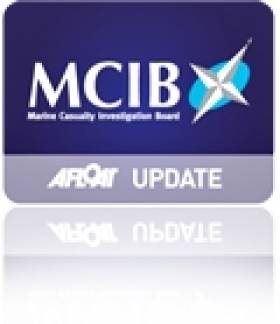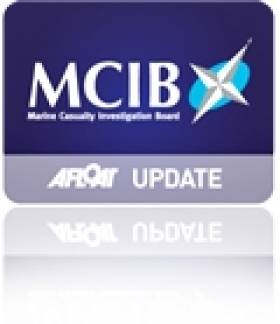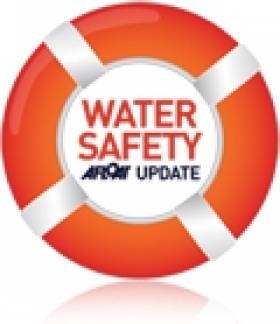Displaying items by tag: MCIB
Safety Measures Highlighted In Report On Angler's Death
#MCIB - The Marine Casualty Investigation Board (MCIB) has again advised recreational boat users to prioritise safety while on the water following the death of an angler on Lough Corrib earlier this year.
Clarifying the story previously reported on Afloat.ie, Michael Ruane died by drowning after he and angling partner Donal Coyle were knocked overboard from their small craft when it heeled over on a large wave off Annaghdown on 19 March 2012.
Coyle was treated for hypothermia after an unsuccessful attempt to search for his colleague, whose body was recovered by the Irish Coast Guard more than two hours after he entered the water.
The MCIB report into the incident found that the revolving seat used by one of the two men on board meant that "both his height above the gunwale and his position right forward may have had an influence on the handling and stability of the boat", which was not compliant with the EU Recreational Craft Directive.
It also found that while both were wearing personal flotation devices (PFDs), they were only loosely fitting - explaining why Ruane became separated from his lifejacket shortly after going overboard.
Moreover, the kill cord on the boat's engine was not used by either man, which caused them to be separated from their vessel. "The consequence of this," the report said, "was a long period of immersion in cold water which led to the death of one of the men and hypothermia of the other".
There was also a delay of more than an hour in raising the alarm as the men in the water had no means to indicate their distress. Coyle had a mobile phone but it was rendered useless by immersion.
The MCIB has recommended that owners and operators of recreational craft should be aware and follow the Department of Transport, Tourism and Sport’s (DTTAS) Code of Practice for the Safe Operation of Recreational Craft. The complete report is available to download below.
Meanwhile, problems with the auto-pilot system were judged to be the trigger of events that caused the scuttling of fishing vessel Jeannete Roberta in Glandore Harbour last December.
The prawn boat was returning to port on 11 December 2011 when the skipper had difficulty switching the helm from auto-pilot to manual due to a known issue with "sticky solenoids".
While the skipper addressed that issue, the boat suddenly altered course without warning - another issue known to occur randomly - and was holed on rocks on the southern side of Adam's Island before eventually sinking.
While castigating the owner/skipper for continuing to sail the vessel with persistent navigation issues, the MCIB also noted that all six crew survived the incident uninjured, finding that all stayed calm and organised as they abandoned ship, and that all safety and communications equipment functioned as required.
Lack of Planning, Safety Gear Instrumental in Donegal Point Drowning - MCIB
#MCIB - The Marine Casualty Investigation Board (MCIB) has reiterated the importance of forward planning and safety before going on the water after the drowning of a man off Donegal Point in Co Clare on 5 November last year.
The official report into the death of Latvian national Armandas Silins (52) found that he had gone out into the water in a remote area off Kilkee in a small inflatable dinghy with no safety or communications equipment.
It was established that Silins, who had been living in the Kilrush area for around a decade, had owned the dinghy for some time but there was no evidence that he had ever used it to fish.
It was also found that he had not informed any third parties of his plans for that day.
Local man William Ryan spotted Silins in the dinghy in rough seas close to an enclosed bay known as the 'Horseshoe'.
Ryan took photographs of Silins - included in the report - moments before the dinghy capsized. He immediately raised the alarm and kept in contact with the Kilkee Coast Guard Unit while Silins was in the water trying to hold on to his dinghy.
By the time a coastguard rescue team arrived in the area, Silins had become separated from the dinghy, and his body was located nearby shortly afterwards.
The MCIB report found that it was "fortuitous" that William Ryan had been in the area to observe Silins in the water and contact emergency services.
It concluded: "The circumstances attending the incident were tragic in the extreme but avoidable."
The full report on the Donegal Point incident is available to download via the link below.
Bilge Alarms Recommended for Fishing Vessels - MCIB
#MCIB - Bilge alarms in compartments below the water line have been recommended for fishing vessels in the official report into the sinking of the FV Amy Jane off Donegal last year.
As previously reported on Afloat.ie, the six-man crew of the crabber were rescued by coastguard helicopter some 13 miles off Malin Head on the morning of 7 October 2011 after the boat began taking on water overnight.
The vessel had left Greencastle Harbour in the early hours headed out to haul pots from the crab grounds off Malin Head when the crew discovered that the boat was down by the head. The pot store was found to be full of water, and attempts to pump it out made little difference.
The alarm was raised via radio with Malin Head Coast Guard before 9am and Irish Coast Guard helicopter Rescue 118 was tasked to the scene, lifting all six crew from the stricken vessel by 10.30am.
The report by the Marine Casualty Investigation Board (MCIB) found that corrosion within the Vivier tank system - used to preserve the boat's catch - was the likely source of the breach that led to the vessel taking on water.
Though an unusual thump or bump was noticed by the skipper on watch around 3am, nothing obvious was discovered, and neither the listing at the boat's head nor the flooding of the pot store - which had no bilge alarm - were noticed till after sunrise.
Aside from recommending the installation of bilge alarms for all compartments below the water line on fishing vessels, the report also called for consideration to include survey guidelines for Vivier systems, which are exposed to the same environment as the hull.
The full report on the Amy Jane incident is available to download via the link below.
Overboard Recovery Systems Recommended After Achill Trawler Drowning
#MCIB - The Marine Casualty Investigation Board (MCIB) has recommended the use of man overboard recovery systems on board fishing vessels after the death of a crewman on the MFV Mark Amay II off Achill Island last year.
Cathal McDaid drowned after being carried overboard from the four-man fishing trawler when he stumbled on the boat's launching net while crossing the deck on the morning of 10 May 2011.
The MCIB report found that McDaid apparently lost his safety helmet and hit his head either on the stern ramp as he was being carried over, or against the hull of the vessel while in the water, possibly rendering him unconscious - which explains why efforts by the crew to throw him a lifebelt proved fruitless.
The situation was compounded by McDaid's choice of personal flotation device. Though he was wearing a PFD on deck, as were all crew members, it was of the waistcoat kind without a collar "that will not turn the wearer onto his back and keep his head out of the water".
Had he been wearing such a collar, it would have "significantly reduced the likelihood of his drowning".
Conditions at the time of the incident were also very poor, with force 5 to 6 south-easterly winds and seas of up to 5 metres, with the vessel pitching severely, which made it impossible for the crew to put a wire line around McDaid and hoist him aboard.
He was instead pulled into the vessel's liferaft, where fellow crew Charles McDaid and Joáo da Silva alternately administered CPR to little avail.
The crew contacted Malin Head Coast Guard, which tasked the Sligo-based Rescue 118 helicopter to the scene, some 52 nautical miles west of Achill Beg.
The Irish Coast Guard aircraft arrived some 90 minutes later and winched Cathal McDaid aboard, flying him directly to a waiting ambulance at Sligo Airport, where he was pronounced dead on arrival.
In its official report into the incident, the MCIB noted that McDaid had been standing on the deck against the established safety rule for the vessel's crew that no standing on the trawl deck is permitted when the net is being shot.
It also found that had his safety helmet been properly secured, it may have prevented the blow to the head from rendering him unconscious, and that had be been equipped with a safety harness it may have stopped him from being dragged overboard by the net when he fell on deck.
The most significant conclusion, however, was that no formal arrangement was in place on the Mark Amay II to recover a crewman from the water.
To this end, the MCIB recommends that "a proprietary type of man overboard recovery system, such as the Jonbuoy MOB Recovery Module or similar be available on board and that all crew are trained in its use". It is also recommended that the Minister for Transport consider issuing a marine notice to that effect.
The full report on the Mark Amay II incident is available to download via the link below.
MCIB Report on Fastnet Yacht Rambler 100 Highlights Issues that Delayed Crew's Rescue
#RAMBLER 100 - The "dramatic and catastrophic" failure of the keel on the Fastnet Race yacht Rambler 100 triggered a series of events that ultimately delayed the rescue of the crew, according to the official report into the capsize.
Among the conclusions of the report by the Marine Casualty Investigation Board (MCIB) were that the upturned vessel would have been visible from a much greater distance by rescue crews had the hull been painted with a bright colour.
The report also advised yachtsmen to look out for signs of keel failure on one-off design yachts, many of which in previous cases were found to be caused by weld fractures.
As previously reported on Afloat.ie, the Rambler 100 capsized shortly after rounding Fastnet Rock during the 2011 edition of the Fastnet Race on 15 August last year.
Sixteen of the 21-strong crew managed to climb onto the upturned hull, while the other five were later picked up from the water after drifting away from the vessel. Photos of the rescue of the yacht's crew are available HERE.
The MCIB report found that the 100-foot racing yacht capsized very quickly once the keel had fractured, surprising the crew and leaving them no time to react other than to get to safety.
Because of this, a number of opportunities that may have hastened their rescue were missed, the report outlines.
Firstly, a 'Mayday' broadcast via the yacht's installed VHF received no response, possibly because the mast was quickly underwater. The navigator's handheld VHF radio was also lost while he was swimming out of the capsizing vessel.
It was noted that two grab bags containing EPIRBs were stored under the navigator's seats port and starboard which proved inaccessible once the boat was capsizing. The report concludes that had such equipment been located within reach of the companion way or by the helm, it would have proved easier for one of the crew to grab before leaving.
Two liferafts stored in containers on the aft deck were also inaccessible with the hull inverted. An alternate method of releasing them from their storage box would have made it possible to launch at least one of the rafts, the report asserted.
It was found that the leverage of the water ballast tanks contributed to the rapid inversion of the vessel once the boat lay on her side in the water. This left no time for the off-watch crew below deck at the time of the incident to reach either foul weather gear or personal flotation devices (PFDs).
The report also recommended that an escape hatch would have aided the off-watch crew's escape from the upturned hull, though thankfully they were able to remove themselves from below deck without becoming tangled in loose ropes or other equipment.
Although each crew member was issued with a safety pack containing a PLB and strobe light, only two were available to those on the upturned hull, and none to the five who drifted away. The report states that it "would have greatly aided the rescue services had each of the survivors carried their own PLB and activated it on entering the water".
Moreover, it was found that incomplete registration information for the two PLBs that were activated caused some confusion as to the identity of the vessel in distress, and led to a delay of around an hour before a full-scale search ad rescue operation was launched.
The report did not investigate the reason for the keel failure, only the fact that it caused the capsize, and that further analysis on the keel is being carried out by the appropriate authorities.
The MCIB also outlines a list of safety recommendations based on its conclusions which have been made primarily to the International Sailing Federation (ISAF) for inclusion in its special regulations for future offshore racing events.
The full report is available to download via the link below.
Marine Notice: Alcohol and Drugs Onboard Pleasure Craft
#WATER SAFETY - The Department of Transport, Tourism and Sport (DTTAS) has published a Marine Notice addressed to all pleasure and recreational craft owners, masters and users to remind the public of the law in relation to being under the influence of alcohol and/or drugs when operating or being on board a vessel in Irish waters.
The 2010 Annual Report of the Marine Casualty Investigation Board (MCIB) highlighted the dangers inherent in excessive alcohol consumption while on board or operating a vessel and emphasised the relevant legislation under the Pleasure Craft (Personal Flotation Devices and Operation) (Safety) Regulations.
While operating a pleasure craft, being towed or on board any floating vessel, it is against the law to be under the influence of alcohol or drugs or any combination of drugs or of drugs and alcohol to such an extent as to be incapable of having proper control of the craft.
It is also against the law to consume alcohol or drugs in circumstances which could affect the safety of others on board or others using Irish waters, or create a disturbance on board or be a nuisance to others using Irish waters.
It is a requirement for the master or owner of a pleasure craft to take all reasonable steps to ensure that persons comply with the regulations.
The Maritime Safety Act 2005 also contains a range of provisions relating to the prohibition on operating a vessel in Irish waters while under the influence of alcohol or drugs, the breaking of which can lead to fines of up to €5,000 and up to three months' imprisonment.
Full details are outlined in Marine Notice No 56 of 2012, a PDF of which is available to read or download HERE.
#MARINE NOTICE - The latest Marine Notice from the Department of Transport, Tourism and Sport (DTTAS) draws mariners' attention to the official report on the sinking of the fishing boat Ainmire and its recommendations for safety on board all fishing vessels.
As reported in September last year on Afloat.ie, the report by the Marine Casualty Investigation Board found that a breach in the engine compartment caused the Ainmire to take on water and sink off the coast of Scotland in April 2011.
The report concluded that the failure of a sea water cooling pipe in the engine room was the most likely cause of the flooding, and noted that the pipework had not been renewed during the life of the vessel.
Investigators also noted that the bilge pump was located under the floor plates in the engine room as was this inoperable when the water level rose in the compartment.
Marine Notice No 58 of 2012 - a PDF of which is available to read and download HERE - reminds fishing vessel operators that large sea-water inlets in engine rooms make their boats vulnerable to severe flooding if they fail.
It is recommended that these pipes should be checked for corrosion every year, especially around the welded joint at the hull. Ultrasonic thickness testing of the pipework should also be considered.
Moreover, such pipework can be eroded quickly by stray currents, so electrical equipment should be checked regularly, while the location of bilge pumps in the engine room should be carefully considered
Report on Cargoship Grounding at the Boyne Bar
#MCIB REPORT– A report investigating the grounding of the Arklow Raider (2007/2,999grt) at the mouth of the River Boyne in 2010, was published yesterday by the Marine Casualty Investigation Board (MCIB).
The 89m general cargoship managed by Arklow Shipping Ltd had docked in Drogheda on 10th November to discharge a full cargo and this was followed by loading cement in bulk.
The Dutch built vessel remained in the Co. Louth port until she departed on the evening tide of the 16th November, however as the vessel passed the bar at the entrance to the River Boyne, it took to the ground and became fast.
The vessel was successfully re-floated on 19th November. Once afloat, checks were made and the vessel was towed to Dublin. At Dublin, the cargo was transhipped to another vessel and the vessel entered dry dock in the port for repairs to the hull and steering gear. Nobody was injured and no pollution occurred.
To read the report in full, copies in PDF format are available to download from the MCIB website HERE.
#MCIB - The Marine Casualty Investigation Board (MCIB) has recommended that the Government review standards for activity centres involved in marine sports, following its report into an incident off Co Louth in May 2011.
Seven sixth-class pupils from St Brigid's Girls National School in Glasnevin were stranded in the water when their kayaks capsized in rough conditions near the Neptune Outdoor Centre in Clogherhead on 26 May last year.
Six of the girls were rescued by the RNLI Clogherhead lifeboat, while a seventh who had been separated from the group managed to reach the shore with some difficulty. No injuries were reported in the incident.
Among its findings, the MCIB concluded that as it had no official affiliation with either the Irish Sailing Association or the Irish Canoe Union, the Neptune Outdoor Centre - which has since ceased trading - was effectively unregulated with no monitoring of staff or operations.
It was also found that the instructor on the day had no formal qualifications in taking charge of a group of young people on the water, despite many years of experience in marine sports.
Moreover, there was no support boat available to mount a rescue attempt, a number of the pupils involved had ill-fitting buoyancy aids, and the weather conditions at the time of the incident were not conducive to taking a group of novices out on the water.
It was noted that some of the pupils involved credited a water safety course with helping them to take the right course of action when in the water, such as staying with their craft and floating with the waves on their backs.
The MCIB recommends that the Minister for Transport, Tourism and Sport reviews the existing arrangements for marine-based activity centres, and in particular develop standards for safety management (including weather checks, pupil-to-teacher ratio, etc), safety equipment (lifejackets, VHF radios, etc) and instructor qualifications.
The full report is available as a PDF from the MCIB website HERE.
Marine Notice on Legal Requirements for Personal Flotation Devices
#WATER SAFETY - The latest Marine Notice from the Department of Transport, Tourism and Sport (DTTAS) addresses the legal requirements for all recreational craft owners, masters and users in relation to the wearing and carrying of personal flotation devices (PFDs).
The notice discusses the different types of PFDs - lifejackets and buoyancy aids - and their performance standards, as well as highlighting the importance of their use, proper care and servicing for safe activities on the water.
The law makes clear that there must be suitable PFDs for everyone on board any pleasure craft, and that PFDs must be worn by anyone the deck of any craft or on board any open craft that is under seven metres in lengh - or for people under the age of 16, any craft regardless of length.
Also detailed are recommendations for the storage of PFDs, and guidance for their correct usage.
The use of lifejackets and buoyancy aids is particularly important in light of the recent Marine Casualty Investigation Board (MCIB) recommendations on a number of incidents where their availability could have saved lives.
Full details are included in Marine Notice No 45 of 2012, a PDF of which is available to read or download HERE.




























